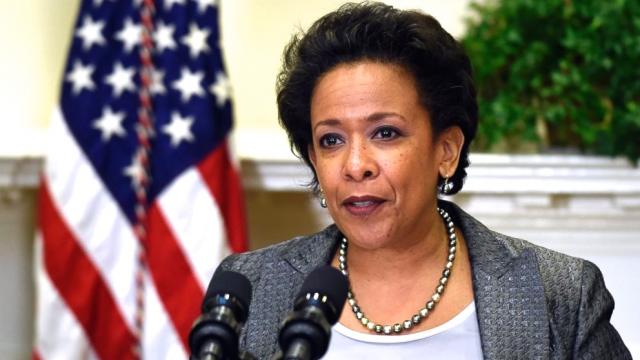
The Justice Department will open a far-reaching investigation into the Chicago Police Department, Attorney General Loretta Lynch announced on Monday, in response to questions about how police handled the case of a black 17-year-old shot dead by a white officer. U.S. attorneys will investigate “whether the police department as a systemic matter has engaged in constitutional violations of policing,” Lynch said in a press conference in Washington D.C.
When police violate the law, Lynch said, “there are profound consequences for the wellbeing of their communities, for the rule of law and for the countless law enforcement officers who strive to fulfill their duties with professionalism and integrity.”
Lynch said the investigation would specifically examine police use of force, racial disparities in that use of force, and how the Chicago department disciplines officers or handles accountability. She has ordered similar investigations into police departments in Baltimore and Ferguson, Missouri, after sustained protests over the police-involved deaths of Freddie Gray and Michael Brown.
On Monday, she said that should attorneys find “unconstitutional patterns or practices,” they would report them and “seek a court-enforceable agreement” to make sure the city passed reforms. People took to the Chicago streets to protest police misconduct after the department released dashcam video of the 2014 killing of Laquan McDonald, a teenager who was shot 16 times by officer Jason Van Dyke. The footage was released only after Van Dyke was charged with murder.
“When suspicion and hostility is allowed to fester it can erupt into unrest,” Lynch said.
The inquiries in Baltimore and Ferguson homed in on “patterns and practices.” The Ferguson investigation did not result in criminal charges but found wide racial discrimination, and compelled the city to enter a contract with the department under threat of legal repercussions. A statement from the Chicago police said the Justice Department was already investigating “any actions and statements of CPD officers in connection with this shooting.”
Last week, Mayor Rahm Emanuel fired police superintendent Garry McCarthy over the Laquan McDonald video, but critics accuse the city of systematic abuses. Emanuel has been accused by some of delaying the video’s release to save a re-election campaign, and hundreds of pages of Chicago police reports released late on Friday contradict what happens in the video.
News of a sweeping new Justice Department investigation came on Sunday afternoon as 200 protesters, politicians and clergy marched throughout downtown Chicago, part of continuing efforts to force change to the city’s policing.
The city also faces scrutiny for the use of the off-the-books warehouse facility known as Homan Square, where more than 7,000 people have been held since 2004. Cook County commissioner Richard Boykin said earlier this week that he expects the Justice Department to investigate the site in addition to police practices in shootings.
In response to a question from the Guardian, Lynch said the investigation does not yet include the Homan Square allegations. Although “the issues that you raise are extremely important,” she said, “they’re not at this time in the purview of this investigation.”
But “we always reserve the right to expand it,” she added, although “at this point in time it is a use of force investigation.”
Also on Monday, Chicago prosecutors will announce the results of an investigation into the killing of 25-year-old Ronald Johnson, who was shot six times by police in 2014. Police have said Johnson aimed a gun at officers, but family claim he was not armed. The city is expected to release video of the shooting this week, after the family filed a lawsuit.
Civil rights leader the Rev Jesse Jackson told the Associated Press he was pleased with the decision to investigate Chicago, insisting the investigation should extend to Emanuel’s office and the Cook County state’s attorney’s office, which he and others have criticized for taking so long to bring charges against Van Dyke.
“All three of them – the police, city hall and the prosecutor’s office – are suspect,” Jackson said. “We cannot trust them.”
A “patterns and practices” investigation like the one expected in Chicago does not criminally charge individuals, but often results in a consent decree between the police department and Justice Department to agree to new practices and accountability measures.
3 WAYS TO SHOW YOUR SUPPORT
- Log in to post comments












